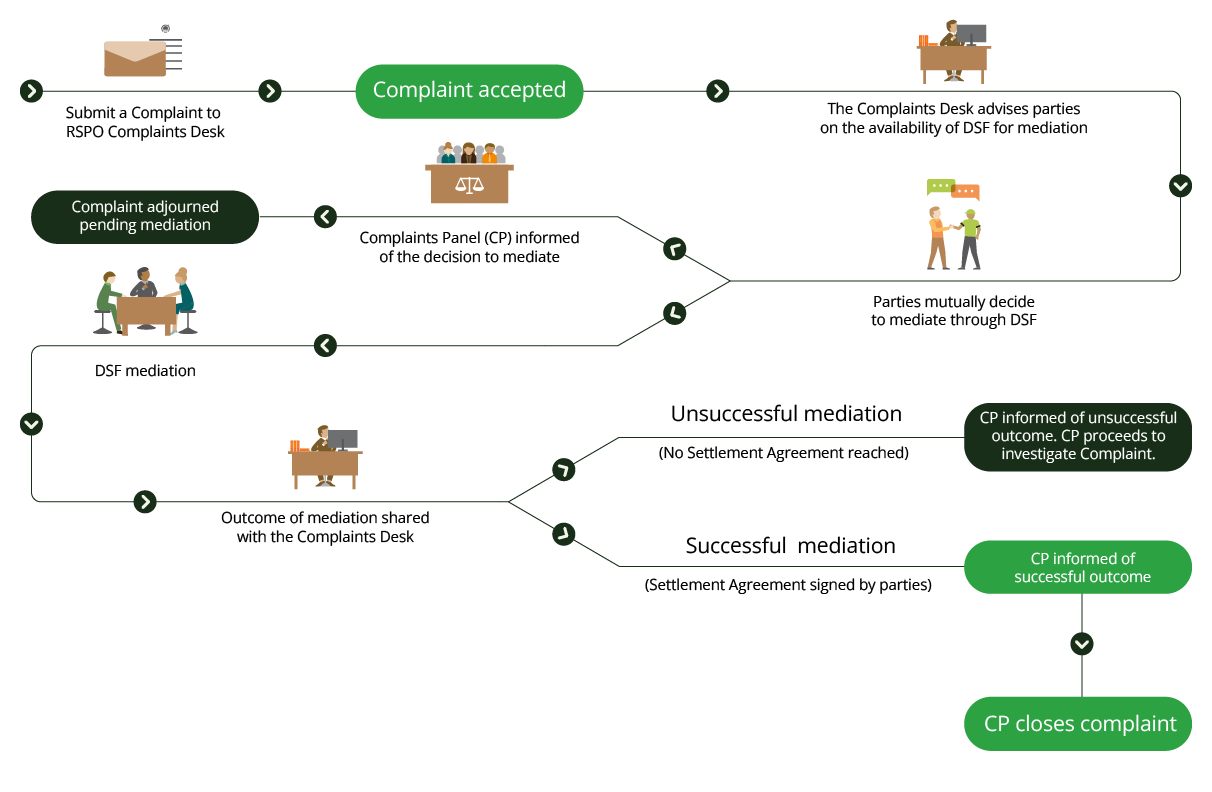Dispute Settlement Facility (DSF)
The RSPO Complaints System enables stakeholders to address complaints against an RSPO Member who has allegedly breached the RSPO Principles and Criteria (P&C), Code of Conduct, or other key documents.
The Dispute Settlement Facility (DSF) is a part of the RSPO Complaints System. It offers complainants, RSPO Members, and relevant stakeholders who are involved in a complaint, the opportunity to resolve these matters through mutually agreed terms, with the help of DSF Mediation.
DSF Mediation requires parties to mutually agree on an independent mediator to facilitate negotiations in a structured process.
The process of DSF Mediation
Voluntary participation
DSF Mediation can only be accessed if both disputing parties mutually agree to engage in the process.

Confidential
No information shared during the mediation process will be disclosed without the consent of all parties.

Independent and impartial
The decision-making authority rests entirely with the parties. DSF Mediation does not impose any judgement or decision on either party.

DSF Mediation Process

If funds are needed for mediation
Parties without sufficient funds may put in a request to the Secretariat for financial assistance to participate in the mediation process.
Financial assistance may include, but is not limited to, covering the fees of the appointed mediators/technical experts and related costs on behalf of the parties.
The primary aim of the financial assistance is to ensure that parties are able to co-own the mediation process.
DSF Advisers
DSF is supported by a group of Advisers with practice and experience within local communities, civil society, the palm oil industry, and dispute resolution forums. This will contribute to open discussions and enquiries on the DSF’s continuous process of evaluating insights and lessons learned on trends emerging in the context of disputes within the palm oil industry.
The appointment of Advisers is stipulated in clause 12 of the ToR for DSF Group of Advisers. The DSF advisers are required to recuse themselves from any potential Conflict of Interest (COI) and the DSF Advisers cannot be directly involved in a DSF Mediation case.
While acknowledging the Advisers’ valued support and guidance to the DSF, responsibility and authority in terms of oversight or administration of a DSF case rests with the DSF Office within the RSPO Secretariat, which extends to the appointment of DSF Mediators. Specifically, and in line with DSF Principles relating to Confidentiality, DSF Advisers will not engage with any party or stakeholder during the course of a DSF Mediation, nor are they party to any information relating to individual cases handled by the DSF which is not otherwise in the public domain.
To learn more, please read the RSPO DSF Advisers Terms of Reference.
Paul Wolvekamp, Chair
Paul Wolvekamp joined Both ENDS in 1989 and is currently its Senior Policy Adviser. He is vice-chairman of the Asia based NFTP (non-timber forest products) Exchange Programme, and a member of the Dutch Advisory Commission on Sustainable Biomass.
He served in various advisory capacities, e.g. on CIFOR’s certification research programme, and undertook assignments for private foundations, Dutch government and European Commission, including the development of an Indian-Dutch Environmental Fund. This evaluated the European Commission’s contribution to dry land management and the ‘Africa Regreening Initiative’.
He initiated and moderated the RSPO Dispute Settlement Facility working group. Paul obtained his BA in law, MA political sciences and diploma in environmental sciences at Leyden University.
Dr. Helena Varkkey
Throughout her academic career, sustainable development has always been an area of interest for Dr. Varkkey. Her passion and support towards this topic are demonstrated by her focus on transboundary pollution in Southeast Asia. Dr Varkkey is particularly interested in the role of patronage in agribusiness, especially the palm oil industry, and its link to forest fires and haze in the region. In 2016, her findings were published in a book, The Haze Problem in Southeast Asia: Palm Oil and Patronage, which was a part of the Routledge Malaysian Studies Series. Additionally, her commentaries on sustainable development and haze issues have also been published in The Straits Times Singapore and CNN Online, among others.
Mauricio Chaves
Practicing Colombian lawyer with vast experience in the areas of Corporate Law, Private International Law, Mediation and Peaceful Settlement of Disputes. Legal and business international consultant for the Asia-Pacific & Europe regions through the firm 8 LEGAL; Arbitrator and Conciliator at law; Member of the arbitration panels of Bogota and Medellin (Colombia) Chambers of Commerce arbitration centres and China International Economic and Trade Arbitration Commission CIETAC (China) with extensive experience as a facilitator and conflict manager in the search of peaceful solutions for controversies arising out of commercial and private law relations. Researcher and professor in the areas of negotiation and international mediation. Speaker and judge in several international mediation tournaments.
Dr. Piers Gillespie
Dr. Piers Gillespie has worked across the private, academic and NGO sector in the field of business strategy, facilitation and implementation. In the mid-2000s, Piers was Asia Pacific Manager for an international NGO that focuses on the agricultural sector and delivering sustainability through international supply chains. He has advised the International Finance Corporation (IFC) and United Nations Development Programme on palm oil implementation and agri business matters and consults with both plantation companies and Futureye, a consultancy that focuses on social licence to operate for extractive and plantation companies. Piers currently works at the Department for Energy and Mining in South Australia as the Executive Lead, Social and Community.
Gina Lea Barbieri
Gina Barbieri, a South African human rights lawyer, international mediator and dispute resolution professional, was appointed as the first Ombudsperson for the World Wildlife Fund (WWF) network in 2021. Previously, she managed the World Bank Groups’ private sector mediation unit (CAO) which entailed managing the mediation of complex environmental and social disputes between communities and the private sector across the globe. Before joining the CAO, Gina founded and managed a legal practice in South Africa specialising in mediation and other forms of alternative dispute resolution (ADR). She has mediated numerous disputes in the employment, commercial and community arena and is the author of two books on labour practice in the public and private sector. Gina co-authored and edited two IFC publications on the establishment of ADR Centers in emerging markets and guidelines on the practice of ADR. Gina obtained her BComm LLB from the University of KwaZulu-Natal and is a CEDR (UK) and IMI accredited international mediator.
DSF Mediators
In appointing a Mediator to manage the DSF Mediation, DSF will draw on its global network of pre-qualified mediators, experienced in managing multi-stakeholder disputes. DSF mediators work in accordance with the DSF Mediator Code of Professional Conduct and report to a DSF Case Manager who coordinates finances, contracting and reporting and provides technical as well as logistical support to the Mediator.
Where possible, DSF will select a Mediator with the requisite professional and language skills from the country or region where the case is located. If such a Mediator is not available, DSF will select whomever is believed to be the most suitable while taking into consideration the location and context of the particular case.
The DSF Mediator is a de facto process manager who will utilise and match a range of techniques when working with divergent groups and parties to a dispute which may include facilitation, information sharing, joining fact-finding, consensus building, capacity building and mediation.
Fahmi Shahab
Fahmi Shahab is the Executive Director of the Pusat Mediasi Nasional – Indonesian Mediation Centre (PMN) — a professional and independent institution providing mediation and certified mediation training courses and one of the most senior training providers accredited by the Indonesian Supreme Court, based in Jakarta. He has been a facilitative mediator since 2000, assisting parties in getting deals on debt restructuring, shareholder disputes, and other business disputes. He is also empanelled as a mediator with PMN, first-instance courts, LAPS SJK [Alternative Dispute Resolution (ADR) for Financial Services Sector Dispute], the Roundtable on Sustainable Palm Oil (RSPO) and the Asia Pacific Centre for Arbitration and Mediation(APCAM), where he also serves as Secretary General. Fahmi also serves as Ambassador of the Singapore International Mediation Centre (SIMC).
Fahmi has served in various roles including as Chairman of the Asian Mediation Association (AMA), Consultant in Enhancing Democracy and Citizens’ Trust in Governance: Adopting a Fair Treatment Approach in Indonesia’s Ombudsman Offices (PMN-Vrije Universiteit Amsterdam-Dutch National Ombudsman-Centre for Conflict Resolution-Van Vollenhoven Institute: consortium); Senior Short-Term Expert in EU-Indonesia Trade Cooperation Facility; Technical Assistant on Alternative Disputes Resolution to the Indonesia Investment Coordinating Board (BKPM) and Visiting Fellow at Gakushuin University, Tokyo, Japan.
Fahmi holds a Master of Business Law (MBL) from the University of Sydney, Australia as an AusAID-ADS scholarship recipient, and a Bachelor’s Degree in Economics (SE) from Gadjah Mada University, Indonesia.
Hyang Ismalya Mihardja
Hyang I. Mihardja, S.H., MBA., has over 18 years of professional experience that includes leadership positions in national private companies. Since being certified by the Indonesia Mediation Centre in 2004, she has consistently promoted negotiation and mediation as an appropriate dispute resolution method. She started her career in Alternative Dispute Resolution as a collaborative lawyer, following as a negotiator and mediation practitioner in contractual issues.
She provides expertise in managing cases related to labour issues. She has been involved in mediating several negotiations in public disputes between companies, government, stakeholders and community’s organisations, some of which were related to Corporate Social Responsibility (CSR) issues.
Hyang is a Co-founder of the EYR Centre for Legal Studies, and is recognised as an expert on conflict resolution at the national organisation Maritim Muda Nusantara. She is a representative of the Pusat Mediasi Nasional – Indonesian Mediation Centre (PMN), a Board Member of the Asia Pacific Centre for Arbitration and Mediation (APCAM).
She is active as a trainer and a coach at PMN, Justitia Training, and MedArbid (Indonesian Academy of Independent Mediators and Arbitrators). Her competency has been recognised by the national standard BNSP and is accredited by the Supreme Court of the Republic of Indonesia.
Ben Schoeman
Ben is a highly qualified mediator with a wide range of experience and expertise. He specialises in multi-party complex developmental and commercial mediations, and also provides training, change management, development facilitation, organisational transformation, community conflict management, environmental facilitation and workplace services.
Ben has successfully mediated settlements in large scale environmental conflicts, local government transformation processes, development disputes and land use and tenure matters in several countries. He is accredited by the National Mediator Accreditation System (NMAS) in Australia and is a professional member of the Australian Mediation Association and the Resolution Institute. He serves on the mediator panels of the Compliance Advisor Ombudsman (CAO), Independent Redress Mechanism (IRM) of the Green Climate Fund, Asian Development Bank (ADB) and Converge International. He is also trained and certified in Restorative Mediation Practice.
Ben’s approach to every mediation is collaborative and principled, and he works with parties to find creative solutions that are workable and sustainable. His goal is to consistently assist parties in finding their own solutions that meet their needs within the given context.
Raymond Lee
Raymond Lee is a mediator and mediation instructor at the Pusat Mediasi Nasional – Indonesian Mediation Centre (PMN). Apart from mediating cases, he supports the centre’s training that includes running courses for the Indonesian Supreme Court, Bank Indonesia, the Financial Services Authority, National Human Rights Commission, the Foreign Investment Board, the Election Supervisory Board, the Ministry of Women Empowerment and Child Protection and the public. He is also retained by the World Bank Group and the United Nations Global Mediator Panel as a mediator providing workplace dispute resolutions through mediation, facilitation, and training. He is a PMN-accredited mediator, a court-accredited Mediator in Indonesia, as well as a Centre for Effective Dispute Resolution (CEDR) accredited mediator.
Fluent in English and Indonesian languages, Raymond is known for his offbeat humour, and when not mediating, he writes for Indonesian film and television.
Ambrosius Ruwindrijarto
Ambrosius Ruwindrijarto pioneered and led several organisations working in Indonesia and in Southeast Asia with social and environmental missions through various forms of research and advocacy, independent media, community organising, business development, and entrepreneurship. Mr. Ruwindrijarto is a committed activist, supporting the struggle of Indigenous people, farmers, and fishermen towards ecological, social, and economic integrity.
In 2011 Mr. Ruwindrijarto started his engagement in conflict resolution through his work as an assessor and mediator, working for an international organisation, in a research and advisory capacity with several organisations in Indonesia.
Mr. Ruwindrijarto is the recipient of the 2012 Ramon Magsaysay Award for emerging leadership. In 2010, he was honoured with the Skoll Award for Social Entrepreneurship and was recognised as the Schwab Foundation’s Social Entrepreneur of the Year in 2008.
Javier Caravedo
Javier is a seasoned consultant, mediator, and multi-stakeholder dialogue facilitator working with ProDialogue, the United Nations Development Programme (UNDP), the Inter-American
Development Bank, the Compliance Advisor Ombudsman (CAO) of the World Bank Group, and the Presidency of the Council of Ministers of Peru. As the Executive Director and co-founder of ProDialogue, Conflict Prevention and Resolution, he champions mediation, collaborative problem solving, consensus building, conflict transformation and peace building across Peru and Latin America. With over 20 years of experience, Javier has facilitated collaborative processes with Indigenous communities, grassroots organisations, NGOs, labour unions, the private sector, international agencies, political parties, and government bodies on a range of political, social, organisational, community, and environmental issues.
Javier holds a law degree from the Pontifical Catholic University of Peru and a Master of Laws in Dispute Resolution from the University of Missouri-Columbia, USA. He has also pursued postgraduate advanced studies in human rights at the Wallenberg Institute on Human Rights in Sweden. Javier has taught courses on conflict analysis, negotiation, mediation, and transformative dialogue at various universities in Peru, and co-authored publications on conflict transformation and dialogue, including “Mining, Conflict and Dialogue” and “Conflict Transformation: Contributions to Conflict Analysis and Intervention for Sustainable Development.”
Ivan Ormachea
Ivan Ormachea is specialised in conflict prevention, conflict transformation, facilitation and mediation in social and environmental issues related to extractive industries, family, commercial, workplace and labour disputes. He has been a mediator for the Office of Mediation and Facilitation Services (MEF) of the World Bank, and is currently a mediator and facilitator for the Compliance Advisor Ombudsman, an independent accountability mechanism of the International Finance Corporation (IFC) of the World Bank and for the Independent Consultation and Investigation Mechanism (MICI) of the Inter-American Development Bank (IDB).
Mr. Ormachea is a senior fellow of the Weinstein International Foundation (2017) and served as the Secretary of the National Office of Mediation (Conciliación) of the Ministry of Justice of Peru, and was in charge of implementing the national mandatory mediation system in 2001.
He is the President of the Peruvian NGO ProDiálogo (Prevención y Resolución de Conflictos) and his focus for over 30 years has been teaching, training, research and consultancy on the analysis of social and environmental conflict, conflict prevention, conflict transformation, consensus building mechanisms, and gender and dialogue processes. Mr. Ormachea is also a part-time professor of the Catholic University of Peru in conflict resolution, mediation and negotiation and has a Master´s Degree in Gender Studies from the Catholic University of Peru (2018) and a Masters of Arts in International Relations with a concentration in Conflict Resolution from Syracuse University, NY, USA (1995). He has written books and articles related to mediation, conflict resolution, and gender, masculinities and conflict.
Brenda Brainch
An independent mediator and dispute resolution process facilitator with a legal background, Brenda Brainch has extensive global experience in Alternative Dispute Resolution (ADR), justice and mediation-related programme design, implementation and review. She also works at the front end of infrastructure projects on assessing socio-economic risks and advising on conflict avoidance and mitigation, as well as the design and implementation of FPIC processes and grievance mechanisms. Ms. Brainch has designed and delivered training programmes in mediation awareness and skills to government, private sector and communities, linking to conflict and risk mitigation as well as management and resolution.
Ms. Brainch is interested in and sensitive to cultural variations in the application of international standards in dispute resolution and process design, training and practice, and is a passionate believer in the value that mediation/problem-solving can bring to successful interventions in the informal justice sector. She has managed large-scale collaborative problem solving processes between communities, government and international investors, and helped in the development of international accountability mechanisms. She is likewise committed to monitoring the implementation of agreements to ensure positive outcomes with long-term benefits to all concerned.
Brenda is experienced in workplace mediation and sits on the panels of mediators for the Internal Justice Services of the World Bank Group, the UN Food and Agricultural Organisation (FAO) and the UN Global Mediation Panel. She is also a member of mediator rosters with the Asia-Pacific Centre of Arbitrators and Mediators, the Green Climate Fund Independent Redress Mechanism (IRM), the Roundtable on Sustainable Palm Oil (RSPO), and the European Southern Observatory.
Josephine Ajema Odera, PhD
Dr. Josephine Odera is an international mediator/advisor for international accountability mechanisms and an independent consultant focused on research, mediation, gender and leadership. She is currently engaged as a mediator for the Compliance Advisor Ombudsman of the World Bank Group.
Dr. Odera has extensive mediation, research, teaching, diplomatic and management experience spanning a career of more than 30 years in academia, government, civil society and the United Nations, both in and outside Africa. She has served at senior levels in the United Nations where she was the Regional Director, West and Central Africa, UN Women; Senior Programme consultant for UNDP on capacity building in peace and security; academic staff of the University of Nairobi and was the Director of the African Centre for Inclusive and Transformative Leadership at Kenyatta University. She has been the team leader for regional and international assignments including the review and implementation of the Foreign Policy provisions for the East African Community, the Moderator for the entire process for the establishment of the Intergovernmental Authority on Development (IGAD) Early Warning Mechanism (CEWARN), and chaired the expert panel of resident research for the Forum for African Women Educationists (FAWE).
Dr. Odera has presented numerous academic papers and has published in the areas of mediation of conflicts, peace and security, and gender. She also promotes mentorship programmes for secondary schools.
Dr. Odera holds a PhD degree in Conflict Management from the University of Ghent, Belgium. She is currently the Chair of the board of Trustees, ACODE Uganda; Chair of the Board of Norwegian Church Aid, and a Board Member, Interpeace. She is fluent in English, French and Kiswahili.



